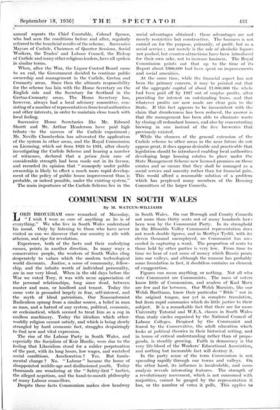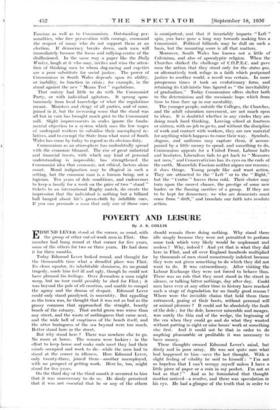COMMUNISM IN SOUTH WALES By M. WATCYN-WILLIAMS ORD BROUGHAM. once
- remarked of Macaulay, I wish I were as sure of anything as he is of everything." We who live in South Wales understand his mood. Only by listening to those who have never visited us can we discover that our country is rife with atheism, and ripe for revolution.
Experience, both of the facts and their underlying causes, points in another direction. In many ways a conservative people, the workers of South Wales cling desperately to values which the modern technological world discounts. Justice, a sense of community, fellow- ship, and the infinite worth of individual personality, are in our very blood. When in the old days before the War we voted Tory, it was with some appreciation of the personal relationships, long since dead, between master and man, or landlord and tenant. Today the same vote is grounded largely in fear, self-interest, and the myth of blind patriotism. Our Nonconformist Radicalism sprang from a similar source, a belief in man as man, and a hatred of any system, political, economic, Or ecclesiastical, which seemed to treat him as a cog in soulless machinery. Today the idealism which other- worldly religion cannot satisfy, and which is being slowly strangled by hard economic fact, struggles despairingly to find, new and vital expression.
The rise of the Labour- Party in South Wales, and especially the Socialism of 'Keir Hardie, were due to the feeling that Liberalism stood for a milder perpetuation of the past, with its long hours, low wages, and wretched social conditions. Amelioration ? Yes. But funda- mental change ? No. " Labour " became the home of disappointed middle-age and disillusioned youth. Today thousands are wondering at the " Safety-first " tactics, the alleged nepotism, and the hand-to-mouth philosophy of many Labour councillors. , . . Despite these facts Communism makes slow headway in South Wales. On our Borough and County Councils not more than thirty seats out of many hundreds hava been won by the Communist Party. In its stronghold in the Rhondda Valley Communist representation does not reach double figures, and in Merthyr Tydfil, with its eleven thousand unemployed, no Communist has suc- ceeded in capturing a ward. The proportion of seats to those held by other parties is very low. From time to time we hear of vast sums of money which Russia pours into our valleys, and although the rumour has probably some foundation in fact, it doubtless contains an element of exaggeration.
Figures can mean anything, or nothing. Not all who vote Communist are Communists. The mass of voters know little of Communism, and readers of Karl Marx are few and far between. Our Welsh Marxists, like our Welsh Barthian, know their particular " Bible " not in the original tongue, nor yet in complete translation, but from rapid summaries which do little justice to their subject. It is a remarkable fact that there are far more University Tutorial and W.E.A. classes in South Wales than study circles organised by the National Council of Labour Colleges. Despised by the Communist and feared by the Conservative, the adult education which looks at political theories in their historical setting, and in terms of critical understanding rather than of propa- ganda, is steadily growing. Faith in democracy is the very life-blood of the Workers' Educational Association, and nothing but inexorable fact will destroy it.
In the party sense of the term Communism is not spreading rapidly through our towns and valleys. On the other hand, its influence is incalculable, and some analysis reveals interesting features. The strength of a revolutionary movement, which is not concerned with majorities; cannot be gauged by the representation it has, or the number of votes it polls. This applies to • Fascism as well as to Communism. Outstanding 'per- sonalities, who face persecution with courage, command the respect of many who do not support them at an election. If democracy breaks down, such men will immediately become the focus and rallying-centre of the disillusioned. In the same way a paper like the Daily Worker, laugh at it who may, invites and wins the atten- tion of thinking men to whom dog-racing and cup-ties are a poor substitute for social justice. The power of Communism in South Wales depends upon its ability, or inability, to function in crisis ; for example, in the stand against the new "Means Test " regulations.
That outcry had little to do with the Communist Party, or with individual agitators. It sprang spon- taneously from local knowledge of what the regulations meant. Ministers and clergy of all parties, and of none, joined in it, but the increasing sense that the stand was all but in vain has brought much grist to the Communist mill. Slight improvements in scales ignore the funda- mental objection to a system which uses the low wages of underpaid workers to subsidise their unemployed re- latives, and to' exempt the State from what most of South Wales has come by today to regard as its obvious duty.
Communism as an atmosphere has undoubtedly spread with the economic blizzard. The rise of great industrial and financial trusts, with which any kind of personal understanding is impossible, has strengthened the Communist idea that economic, not ethical, factors alone count. Moral indignation may be illogical in such a setting, but the common man is a human being, not a logician. Ten years of dole conditions, and endeavours to keep a family for a week on the price of two " stand " tickets to an international Rugby match, do create the impression that the individual is nothing but a billiard ball banged about life's green-cloth by infallible cues. If you can persuade a man that only one of those cues 'is omnipotent,-:and • that 'it invariably imparts -" Left " spin, yOu have gone a long way towards making him a Communist. Political billiards may be dull on such a basis, but the mounting score is all that matters.
Moreover, South Wales has known not a • little of Calvinism, and also of apocalyptic religion. When the Churches shirked the challenge of -C.O.P.E.C. and gave men the notion that they stood only for •the status quo, or alternatively took refuge in a faith which postponed justice to another world, a recoil was certain. In more prosperous times it took • an evolutionary form, and retaining its Calvinistic bias figured as " the inevitability of gradualism." Today Communism offers shelter both to the determinism and the messianic hope which from time to time flare up in our mentality.
The younger people, outside the Colleges, the Churches, and the adult education_ movement, are not much open to ideas. It is doubtful whether in any circles_ they are doing much hard thinking. Leaving school at fourteen or sixteen, with no job to go to, and without the discipline of work and contact with workers, they are raw material for anything which happens.tocome their way. Symbols, .slogans, and uniforms may capture them, if accom- panied by.a little money to spend, and something .to do. Communism_ appeals for a United Front, Labour halts and hesitates, Liberalism fails to get back to " Measures not men," and Conservativism has its eyes on the ends of the earth. Meanwhile Fascism neither argues nor reasons; it does things. Young people like and' want action. They are attracted to the " Left " or to the " Right," but the " Centre " leaves them cold. Their choice may turn upon the merest chance, the prestige of some new leader, or the flaming sacrifice of a groUp. If they are to be kept for democracy, we who are democrats must cease from " drift," and -translate our faith into resolute action.











































 Previous page
Previous page